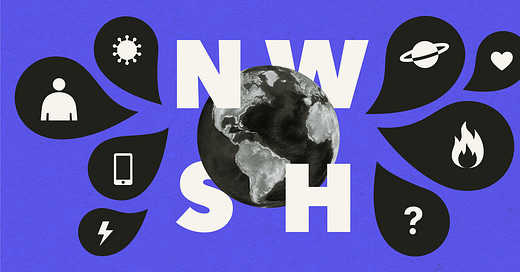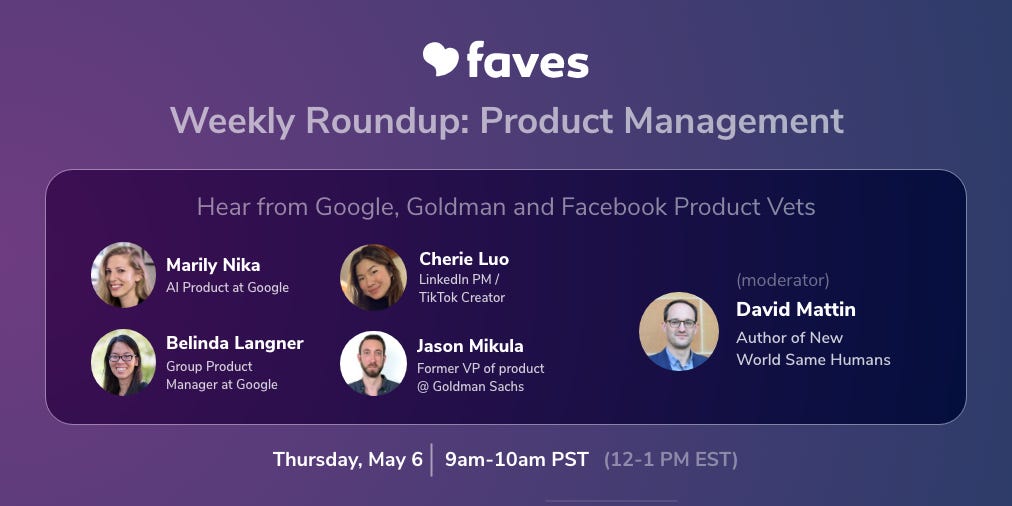New Week Same Humans #34
The cryptocurrency Dogecoin is a $78 billion meme. Scientists say psychedelics could revolutionise treatment for mood disorders. Plus more news and analysis from this week.
Welcome to the mid-week update from New World Same Humans, a newsletter on trends, technology, and society by David Mattin.
If you’re reading this and you haven’t yet subscribed, then join 16,000+ curious souls on a journey to build a better shared future 🚀🔮
💡 In this week’s Sunday note I wrote about the future of work. Go here to read The Coming War Between Labour and Capital.💡
This week, a cryptocurrency that began life as a joke now has a market cap greater than that of Ford. What’s really going on?
Also, Uber strike a partnership with a UK mobility startup that could transform its fleet worldwide. And, via clinical trials, psychedelics are making a comeback.
Let’s go!
🚀 To the moon
The meme cryptocurrency Dogecoin soared this week, hitting an all-time high of $0.68 on Wednesday.
Dogecoin was founded as a joke in 2013. Its roots lie in a random tweet intended to make fun of cryptocurrencies, and a meme featuring a Shiba Inu dog and text written in multicoloured comic sans. Now, via a surge of over 14,000% since the start of the year, it has a market cap of $78 billion.
Behind much of this story lies one man.
Elon Musk has long acted as unofficial Chief Clown Officer for the currency, and the latest rally is driven by news that he will co-host Saturday Night Live later this week. Doge fanatics hope that one or two mentions from Musk – maybe even a full sketch? – will launch Dogecoin into the mainstream, and send the price to the moon.
Stay tuned, and keep your trading app open during SNL (not investment advice).
⚡ NWSH Take: Yes, this is all fun and games. Until you realise that Dogecoin now has a market cap greater than that of automaker Ford, or banking giant Santander. // So what underlies the currency’s incredible run? At heart this is about a recent and still little-understood phenomenon: virality. // Back in New Week #20 in January I wrote about the GameStop furore, which saw an army of Reddit traders turn a tired video game retailer into a meme and drive the share price up 750%. A novel and complex relationship is emerging between capital, markets, and viral information or memes, and that opaque triad underpins both the GameStop story and the Dogecoin rocketship. // It’s all a reminder that, in the end, money is simply crystallised belief. When, via new network effects, millions can unite around shared beliefs – or shared jokes – in a matter hours, strange things happen to money. Strange this happen to value. This is just the beginning.
🚗 Uber x Arrival
Uber is partnering with electric vehicle startup Arrival to build an electric car for UK drivers.
The ride-hailing giant say they want a fully electric fleet in the UK by 2025; it’s clear the new Arrival Car is now central to those plans. Uber say they’ll also explore expanding the partnership to North America and beyond.
Central to Arrival’s vision, meanwhile, is a revolutionary new method for manufacturing EVs. The company is pioneering modular microfactories, which they say can be rolled out to cities around at the world ultra-low cost and make the transition to EVs accessible to all.
We’ll be hearing more from Arrival at an upcoming NWSH event on the future of mobility; details coming soon. In the meantime, more on that vision here:
👋 Talking tech
I’ll be back on Clubhouse on Thursday 6 May – that’s today for most of you reading this! – to host another discussion that I think will be up your street.
It’s in association with Faves, the new smart social media app where experts curate the content they’re reading. We’re bringing together a stellar panel from Silicon Valley and beyond to talk All Things Product.
The room goes live on Thursday at 9am PST, 12pm EST, 6pm CET, and you can register here.
Hope to see you there!
🤩 Old treatment, new treatment
A new study, soon to be published in the journal Nature Medicine, found that MDMA greatly enhances the effect of talking therapy for patients with PTSD.
It’s the first first Phase 3 trial conducted on psychedelic-assisted therapy, and the positive results come in the wake of a new wave of interest when it comes to the therapeutic properties of psychedelics, including LSD and mescaline.
MDMA was first synthesised in 1912, and was widely used as a therapeutic in the 1970s. Then the drug hit dance floors in the 1980s, was rebranded as ecstasy, and banned.
Since then, evidence has established that MDMA taken at therapeutic doses does not damage the brain. Patients in this trial, conducted by Johns Hopkins University School of Medicine, experienced no serious side effects. A second Phase 3 trial is underway, and scientists at John Hopkins say MDMA could be approved for PTSD as soon as 2023.
⚡ NWSH Take: Some will be alarmed at the idea of using powerful psychedelics such as MDMA and LSD as medicines. But both have a long history of use as therapeutics; the 1950s and 60s saw over 1,000 studies. Recreational users typically take far larger doses than those used in studies, often cut with other harmful substances. // Now, a new wave of interest is psychedelics is sweeping through psychiatry; it’s believed psychedelics could prove useful for depression, anxiety, PTSD, and more. That’s huge; the WHO says depression is a leading cause of disability worldwide, and estimates over 264 million people are affected. // Meanwhile, some among the Silicon Valley have separately been extolling the benefits of taking microdoses of LSD. Amusingly, a new study by Imperial College in London – emerging as a major centre for the study of psychedelics – found that microdoses did indeed improve mood and creativity, but so did taking a placebo. // It’s a case in which that familiar phrase is apt: more research is needed. The good news is: that research is finally happening.
🗓️ Also this week
👾 The world’s first esports gym is opening in Tokyo. Customers will be able to book three-hour slots at gaming machines, and receive coaching from professional players.
🧬 Scientists at Harvard have created a new gene editing tool that they say could rival CRISPR. The Retron Library Recombineering (RLR) technique, and it uses segments of bacterial DNA called retrons to introduce mutant DNA strands into replicating cells.
👟 NFT startup RTFKT have raised $8 million in a funding round led Andreessen Horowitz. RTFKT are best known for their virtual sneakers; a sneaker sale in March made $3 million in under seven minutes.
🤯 Amazon made sales of EUR 44 billion in Europe last year, but paid no corporation tax. European revenues were funnelled through Luxembourg, where Amazon has a confidential tax arrangement.
⛏️ The New York state senate is considering a ban on bitcoin mining. A new bill proposes a multi-year ban to allow authorities to assess the environmental impact.
🤦 The Russian opposition ‘deepfake’ that fooled several European politicians wasn’t a deepfake at all. The hoaxers have revealed they used a plain old lookalike. Yep, I was taken in.
🚗 Tech giant Baidu have launched China’s first driverless taxi service. Ten Apollo taxis are operating in a small Beijing district; a safety driver will be seated in the front passenger seat.
🛰️ Elon Musk’s Starlink satellite internet service has 500,000 pre-orders. The company company plans to deploy 12,000 satellites to provide internet anywhere on Earth.
⌚ The next Apple Watch will be able to measure blood glucose and alcohol levels. That’s according to leaked information shared by Apple gossip site MacRumours.
🌍 Humans of Earth
Key metrics to help you keep track of Project Human.
🙋 Global population: 7,863,867,871
🌊 Earths currently needed: 1.7836028685
💉 Global population vaccinated: 3.7%
🗓️ 2021 progress bar: 34% complete
📖 On this day: On 6 May 1889 the Eiffel Tower is opened to the public at the Universal Exposition in Paris.
Let the Doge out
Thanks for reading this week.
Keep your eye on the Dogecoin price when Elon Musk takes to the SNL stage on Saturday.
Whatever happens eventually – a journey to the moon or painful crash back to Earth – this story is a reminder of the essential weirdness of connected, 21st-century capitalism.
New World Same Humans exists to make sense of these kinds of shifts. And there’s one thing you can do to help with that mission: share!
Now that you’ve made it to the end of this week’s instalment, why not forward the email to someone who’d also enjoy it? Or share it across one of your social networks, with a note on why you found it valuable. Remember: the larger and more diverse the NWSH community becomes, the better for all of us.
I’ll be back on Sunday. Until then, be well,
David.
P.S Thanks to Monique van Dusseldorp for additional research and analysis.







